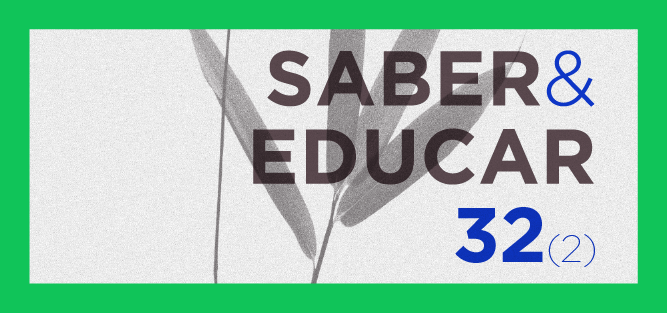Circularities and community intervention
practical approaches to strengthen care networks during the covid-19 pandemic
DOI:
https://doi.org/10.25767/se.v32i2.33095Keywords:
Social Constructionism, Social education, Care networksAbstract
This article aims to present the importance of circularities, circular processes, for the implementation of care networks, taking as an example an educational territory located in the East Zone of the city of São Paulo, Brazil. In the writings, excerpts of data collected through the focus group technique carried out with two social educators from non-formal education spaces are presented and discussed, complemented by the narrative of two formal education professionals, who were based on practices mediated by circular processes and restorative practices, as well as reflections on the importance of care and reception networks in the context of the Covid-19 pandemic. In final considerations, we reflected on the need to encourage participation to implement collective and supportive care in communities.
References
Camargo, D. & Belinazo, N. (Orgs.). (2020). Guia de Práticas Restaurativas e Mediação de Conflitos. Instituto Federal Farroupilha.
Ayres, J. R. C. M. (2004). O Cuidado, os modos de ser (do) humano e as práticas de saúde. Saúde e Sociedade, 13(3), 16-29.
Batista, N., Bernanrdes, J. & Menegon, V. (2014). Conversas no cotidiano: um dedo de prosa na
pesquisa. In A produção de informação na pesquisa social: compartilhando ferramentas (pp. 97-122). Centro Edelstein de pesquisas sociais.
Boyes-Watson, C. & Pranis, K. (2011). No Coração da Esperança: guia de práticas circulares. Justiça para o século 21.
Ferraz, E., Britschgy, L., Gassi, I. & Braga, R. (2019). Transformação de um grupo de estudos a partir de uma investigação apreciativa. In Construcionismo social e práticas colaborativo-dialógicas: contextos de ações transformadoras (pp. 131-148). CRV.
Fundo Internacional de Emergência das Nações Unidas para a Infância - UNICEF. (2023). Educação que protege.
Freire, P. (1967). Educação como prática da liberdade. Paz e Terra.
Freire. P. (1979). Educação e mudança. Paz e Terra.
Freire, P. (1992). Pedagogia da esperança: um reencontro com
a pedagogia do oprimido (6ª ed.). Paz e Terra.
Guimarães, K. & Pinheiro, S. (2021). O desgoverno Bolsonaro e o novo Coronavírus: uma análise preliminar sobre o impacto social dessa combinação no Brasil. In Serviço Social em Perspectiva, 5(1), 32-50. https://doi.org/10.46551/rssp.202102
Justiça em Círculo. (2021). Escolas Relacionais. Youtube, [Stream em direto em 21/05/2021].
Disponível em https://www.youtube.com/watch?v=FexNayA9dcU&t=14s
Pranis, K. (2010). Processos Circulares. Palas Athena.
Pranis, K. (2011). Círculos de justiça restaurativa e de construção da Paz: guia do facilitador. Escola Superior da Magistratura da AJURIS. http://www.takaoconsultoria.com.br/wpcontent/
uploads/2017/04/GUIA_DO_FACILITADOR.pdf
Pranis, K. & Boyes-Watson, C. (2018). Por que trazer os círculos para a escola? http://www.ajurisjr.org.br/wp-content/uploads/2018/11/Circulos-em-Movimento-Por-que-trazer-os-circulos-para-as-escolas.pdf
Pranis, K., Stuart, B. & Wedge, M. (2003). Peacemaking circles: from crime to community. Living Justice Press.
Quadros, L., Cunha, C. & Uziel, A. (2020). Acolhimento psicológico e afeto em tempos de pandemia: práticas políticas de afirmação da vida. Psicologia & Sociedade, 32, 1-15, e020016. https://doi.org/10.1590/1807-0310/2020v32240322
Rodrigues, A. et al. (2019). Construindo a empresa que queremos: um trabalho de investigação apreciativa. In Construcionismo social e práticas colaborativo-dialógicas: contextos de ações transformadoras. CRV.
Schucman, L. V. (2012). Entre o “encardido”, o “branco” e o “branquíssimo”: Raça, hierarquia e poder na construção da branquitude paulistana. Tese de doutorado Universidade de São Paulo.
Schucman, L. V. (2020). Entre o encardido, o branco, e o branquíssimo: branquitude,hierarquia e poder na cidade de São Paulo, (2ª ed.). Veneta.
Silva, D., Santos, M. & Soares, M. (2020). Impactos causados pela COVID-19: um estudo preliminar. Revista Brasileira De Educação Ambiental (RevBEA), 15(4), 128–147. https://doi.org/10.34024/revbea.2020.v15.10722
Spink, P. (2003). Pesquisa de campo em Psicologia Social: uma perspectiva pós-construcionista. Psicologia e Sociedade. 15 (2), 18-42.
Spink, P. (2008). O pesquisador conversador no cotidiano. Psicologia e Sociedade, 20, 70-77. https://doi.org/10.1590/S0102-71822008000400010
Teixeira, R. (2005). O acolhimento num Serviço de Saúde entendido como uma Rede de Conversações.https://www.academia.edu/12909632/O_Acolhimento_num_Servi%C3%A7o_de_Sa%C3%BAde_entendido_como_uma_Rede_de_Conversa%C3%A7%C3%B5es
Vidotto, L. (2018). Participação em processo de formação de facilitadores/as de práticas restaurativas. https://teses.usp.br/teses/disponiveis/59/59142/tde-26112019 111711/publico/versao_resumida_LeticiaVidotto.pdf
Vieira, M.(2020). A educação no contexto da pandemia de COVID-19: uma revisão sistemática de literatura. Revista Brasileira de Informática na Educação, 28, 1013-1031. http://hdl.handle.net/10400.2/10313
Downloads
Published
How to Cite
Issue
Section
License
Copyright (c) 2023 Bruna Tibolla, Juliana Pedreschi Rodrigues

This work is licensed under a Creative Commons Attribution-NonCommercial-ShareAlike 4.0 International License.
- The opinions expressed by the authors are their exclusive responsibility.
- The journal reserves the right to make the original, normative changes, spelling and grammar, in order to maintain the standard language of worship, while respecting the style of the authors.
- Authors retain copyright and grant the journal right of first publication with the work simultaneously licensed under a Creative Commons Attribution License (BY-NC-SA 4.0) that allows others to share the work with an acknowledgement of the work's authorship and initial publication in this journal.
- Authors are able to enter into separate, additional contractual arrangements for the non-exclusive distribution of the journal's published version of the work (e.g., post it to an institutional repository or publish it in a book), with an acknowledgement of its initial publication in this journal.
- Authors are permitted and encouraged to post their work online (e.g., in institutional repositories or on their website) prior to and during the submission process, as it can lead to productive exchanges, as well as earlier and greater citation of published work (See The Effect of Open Access).
PRIVACY STATEMENT
The names and email addresses entered in this journal site will be used exclusively for the stated purposes of this journal and will not be made available for any other purpose or to any other party.






